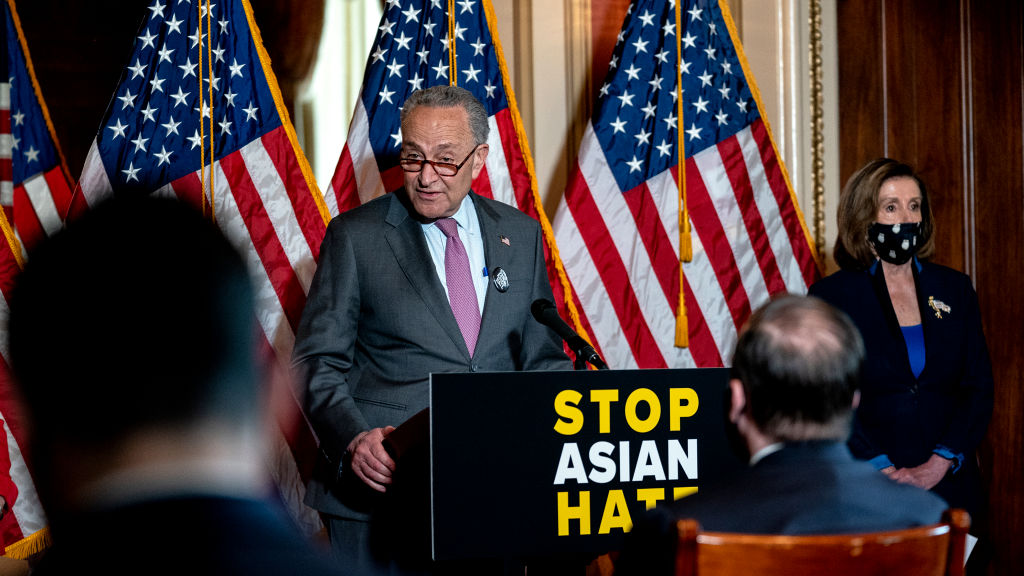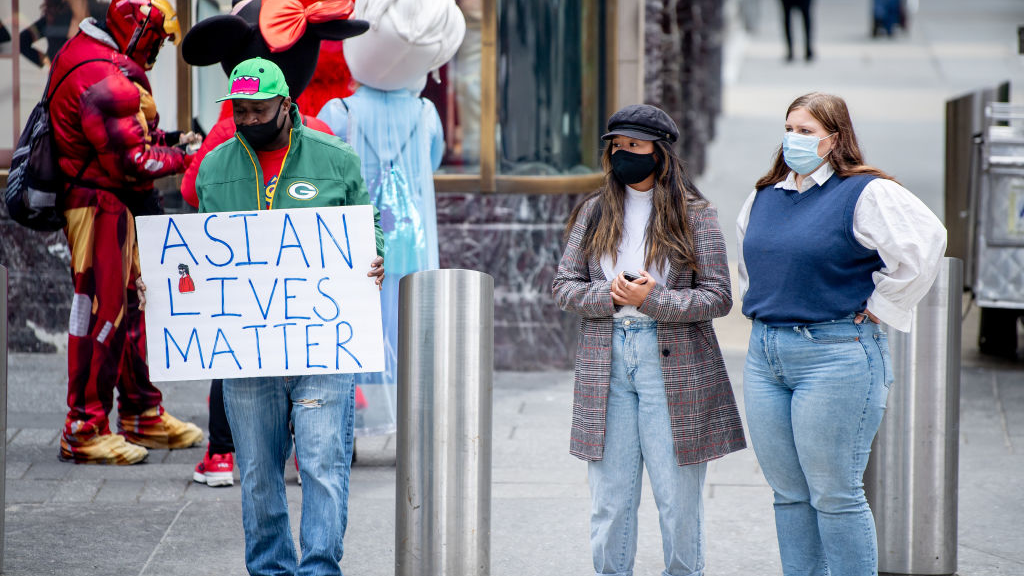
House Speaker Nancy Pelosi (R) listens as Senate Majority Leader Chuck Schumer speaks during a press conference on the COVID-19 Hate Crimes Act at the U.S. Capitol in Washington, D.C., April 13, 2021. /Getty
House Speaker Nancy Pelosi (R) listens as Senate Majority Leader Chuck Schumer speaks during a press conference on the COVID-19 Hate Crimes Act at the U.S. Capitol in Washington, D.C., April 13, 2021. /Getty
Editor's note: Bradley Blankenship is a Prague-based American journalist, political analyst and freelance reporter. The article reflects the author's opinions and not necessarily the views of CGTN.
The U.S. Senate voted on April 14 to advance a bill, the so-called COVID-19 Hate Crimes Act, that would expedite the Justice Department's review of hate crimes against people of Asian descent, expand public reporting for such incidents and provide guidance to states. Even though it passed with bipartisan support, a whopping 92 to 6 vote, the bill still faces significant challenges.
First, because Republicans in the Senate only supported the legislation because they were allowed to include 20 amendments, some of which have nothing to do with the bill itself according to Senator Mazie Hirono, the bill's sponsor. This is sure to cause partisan saber rattling as Senate leaders sort out which amendments to include before it can be passed through the chamber.
One of the main disputes as it stands surrounding the bill is how it connects crimes and COVID-19, which Republicans would like to broaden. However, according to Hirono, the bill needs to link the two because hate crimes against people of Asian descent accelerated precisely because of the Trump administration's rhetoric blaming Asians for COVID-19.
"It really came to the fore during COVID-19 and having a president calling it a 'China virus,' so I think it led to an increase in these kinds of attacks. That's why there's that framing to remind us, how did this happen?" Hirono told HuffPost's Igor Bobic.
On the issue of unrelated amendments, Senator Ted Cruz, for example, proposed an amendment related to immigration that would restrict the Department of Homeland Security from releasing undocumented immigrants into States, counties or cities without consent from the state's governor and the local governing body. Amendments like this will only add unnecessary political spin to an otherwise innocuous bipartisan bill.
Another complication for the legislation is the fact that six hard-line Republican Senators, including Ted Cruz, Tom Cotton, Josh Hawley, Rand Paul, Tommy Tuberville and Roger Marshall voted "no" on the bill as it was presented.
Part of the disagreement from these senators may be because the legislation would offer guidance to states to "mitigate racially discriminatory language," which they may claim infringes on "states' rights." They might also object that the bill might too broadly define what a hate crime is.

A man carries an "Asian Lives Matter" sign in Times Square in New York City, March 25, 2021. /Getty
A man carries an "Asian Lives Matter" sign in Times Square in New York City, March 25, 2021. /Getty
Rand Paul made this same argument when he objected to a bill last year that would make lynching a federal hate crime, a move that was met with intense public outrage. Just as it was then, the case now is hard to make in good faith since the bill is very precise in how it defines hate crimes.
According to the COVID-19 Hate Crimes Act's summary, "It defines COVID-19 hate crime as a violent crime that is motivated by two things: (1) the actual or perceived characteristic (e.g., race) of any person, and (2) the actual or perceived relationship to the spread of COVID-19 of any person because of that characteristic."
When asked for comment by Business Insider, only Cotton's office responded, saying that the vote was because "he's working on related legislation." To his credit, he has previously called for a Senate Judiciary Committee hearing on the issue of violence against people of Asian descent and cited a lack of this procedure as a reason for his no vote.
In a letter to the committee's chairman along with Senator Chuck Grassley, Cotton said, "We are concerned to see that such an important issue has not already received Committee or Subcommittee attention. Instead, S. 937, the 'COVID-19 Hate Crimes Act,' has been moved to the Senate floor with little commentary, fact-finding, or Committee consideration."
This is, however, unconvincing since the uptick in anti-Asian hate crime is easily identifiable and has been noted by many non-partisan groups. Not only would this, but the bill itself expedite the Justice Department's investigation into the matter so that way a Senate hearing would be more productive down the road. What sense would it make to have a Senate hearing when the Justice Department hasn't finished its investigation?
Instead, the metaphysical skepticism of Cotton and presumably some of his other colleagues toward this plain-as-day racism speaks to the uncomfortable fact that their party, namely former President Donald Trump and a significant part of the Republican base, is to blame for the uptick in violence.
Moreover, for them passing this legislation would essentially be an admission of guilt since it places the blame on Trump (and his scapegoating of China and other Asian people) for this increase in hate crimes and they have been signal-boosting the former president this entire time.
This debacle is yet another reminder of how divided the country is if the Senate can't even unanimously agree that racially motivated attacks against people of Asian descent, most of whom are probably U.S. citizens, is indeed a hate crime and work to solve it.
(If you want to contribute and have specific expertise, please contact us at opinions@cgtn.com.)

